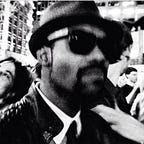In Pursuit of Kung Fu
Kung Fu means supreme skill from hard work. A great poet has reached Kung Fu. The painter, the calligrapher, they can be said to have Kung Fu. Practice, preparation, endless repetition until mind is weary, bones ache and too tired to sweat, too wasted to breath. That is the way one acquires Kung Fu.
In 2014, the headlines in the design community often read ‘Should Designers Code’ or something along those lines. I saw this so often that it made me question my resolve to focus entirely on design, in all its form.
Knowing to code is an asset in the designer skill set, one worth having. However, it’s just that, another asset and certainly not the only one required to be a great designer. In fact, it’s not required at all.
Understanding code is a way to better practice the craft of design but in no way means you’re required to do it.
No one knows better than me, a single design founder, the benefits of knowing to code. However, this debate that good designers must know to code is misguided. It seems to pull designers away from the true purpose of design — solving human problems. This doesn’t mean to say technology doesn’t solve human problems but it being ubiquitous is largely owed to design. Technology needs to be made human and that’s the role of design.
Of all the talks of learning to code, the conversation seems to be boxed into pixel coding but design is so much more — it’s human interaction in all forms. To truly master design, is to be able to design anything that life interacts with — technology, culture, spaces, physical/digital products or systems. Some instances of this can be seen with Massimo Vignelli who designed everything in his home. Joe Doucet is another designer who’ve designed everything you can think of. And then there’s the legendary John Maeda who initially studied programming.
Designing for screens is such a small role to the one design will play in the near future. Technology is becoming more complex and as a result so does the design for it. Why distract oneself with another craft that would take away from attaining Kung Fu in either?
Kung Fu doesn’t necessarily mean there are no other skills to be had. There are others aside from programming a designer can have:
Growth Hacking
Research/Customer Dev
Business Development
Community Development
Brand Development
Product Strategy
Entrepreneurship
Leadership
Sales
Like programming, these are all valuable skills to have. The point is that none of them should take away from achieving Kung Fu in the craft you choose to dedicate your life to. They should compliment it. Having these skills and the degree to which you’re good at them makes you a valuable part of any team.
I personally am reluctant to distract myself with the craft of coding because the knowledge acquired in design meant pouring my everything into it. This is the only way I know how to learn. Doing this for code will become a distraction yet a balance to compliment my craft can be achieved.
Attaining Kung Fu in any given craft requires uncompromising love and passion and then everything else will follow.
It is no surprise that ones resolve would be questioned at times in life thus weakening it. I’ve chosen the meaning of Kung Fu as a compass by asking, “What is my Kung Fu?” For me, if the answer isn’t design then it feels as if I’ve lost my identity.
Some choose to code, some to design and others both. It’s largely about knowing yourself and understanding there’s multiple path to greatness. And so, I’ve chosen to do what I love and am passionate about. Whether I should code or not is irrelevant because what is relevant is having an answer to that question:
What is my Kung Fu?
Sign up for Randomly Accessed Perspectives where every two weeks I share a written piece on life, design, culture and community.
